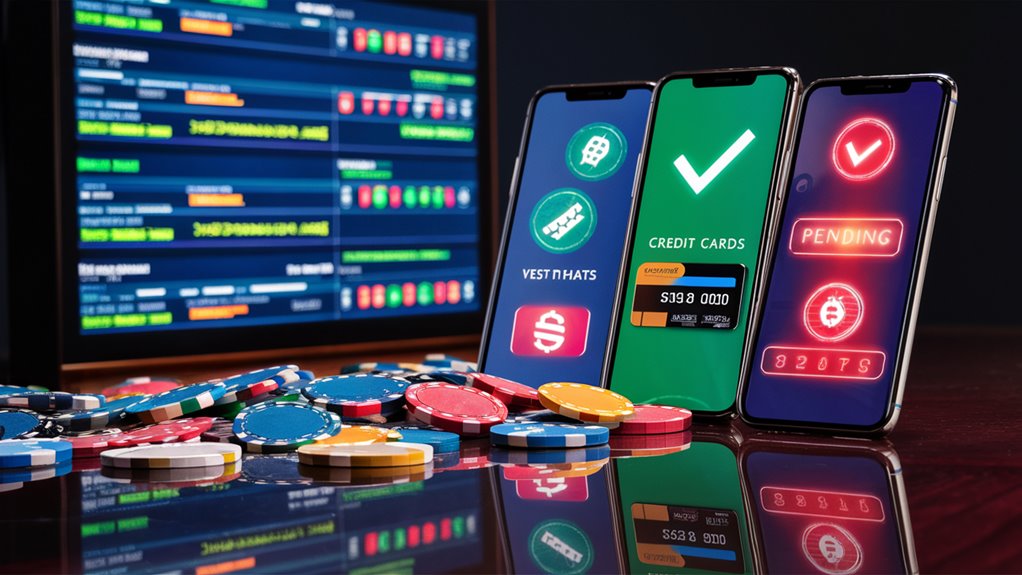
결제 처리 일정 이해하기

결제 인증 속도는 온라인 도박 플랫폼의 흥망을 가르는 강력한 변수입니다. 처리 지연이 길어질수록 이용자 40%가 즉시 거래를 포기한다는 충격적인 통계가 이를 증명합니다. 초고속 인증이 곧 매출 직결의 핵심 경쟁력이 됩니다.
인증 병목 현상은 네트워크 혼잡, 서드파티 연동 지연, 인증 서버 과부하에서 비롯됩니다. 즉각적인 투자와 기술 최적화 없이는 플랫폼 신뢰도가 급락할 수밖에 없습니다.
전략적 관점에서, 인증 지연은 곧 사용자 이탈률 상승, 브랜드 평판 하락, 매출 기회 상실을 의미합니다. 실시간 모니터링과 프로세스 병목 최소화는 플랫폼 성장 로드맵의 필수 요소입니다.
결제 수단별 처리 시간 비교
전자지갑(E-Wallet) 솔루션
전자지갑은 30~60초의 초고속 인증을 자랑합니다. 즉시 승인으로 게임 플레이 흐름을 끊지 않으며, 사용자 만족도를 극대화합니다.
- 즉시 인증: 실시간 승인으로 이탈률을 최소화합니다.
- 높은 채택률: 정기 이용자 사이에서 압도적인 선호도.
- 보안 등급: PCI DSS 인증, 토큰화 기술로 데이터 안전성 확보.
- 유연한 연동: 모바일 SDK 및 웹 플러그인 지원으로 빠른 도입 가능.
- 비용 구조: 거래당 2.9% + \$0.30 수준, 소액 거래에 최적화.
전통적 은행 방식
신용카드와 은행 이체는 안정성을 제공하지만 처리 시간이 상대적으로 깁니다.
신용카드
처리 시간: 1~24시간. 즉시 사전 승인 후 가용성 확인 및 자동 사기 탐지 시스템 연동을 거칩니다.
- Pre-authorization: 즉시 승인 → 최종 청구 대기.
- 3D Secure & CVV 검증: 추가 보안 레이어로 사기 위험 70% 감소.
- SWIFT 네트워크 연동: 글로벌 결제망과의 안정적 연결.
- 거래 수수료: 2.5~3.5%, VIP 사용자 대상으로 할인 프로모션 가능.
은행 계좌 이체

처리 시간: 2~3영업일. 초기 입금 확인, 보안 심사, 최종 반영 단계를 순차적으로 거칩니다.
- 입금 확인: 은행 내부 시스템 간 통신 지연 가능.
- 보안 심사: AML 규제 준수를 위한 추가 서류 검토.
- 정산 처리: 플랫폼 계정 반영까지 평균 48시간 소요.
- 고정 수수료: 건당 \$15~45, 고액 거래 시 비용 최적화 필수.
암호화폐 거래
블록체인 기술을 활용한 암호화폐 거래는 전통 지불 수단을 뛰어넘는 속도와 투명성을 제공합니다.
- Solana: 1초 미만. 초저지연 트랜잭션으로 즉시 게임 진입.
- Ripple (XRP): 약 4초. 네트워크 수수료가 낮아 소액 반복 입금에 적합.
- Litecoin: 약 2.5분. Bitcoin 대비 4배 빠른 블록 생성.
- Ethereum: 약 5분. 가스비 예측이 어려울 수 있음.
- Bitcoin: 10~60분. 6회 컨펌 권장 단계로 안전성 확보.
Zero-confirmation deposits 전략은 신뢰 등급이 높은 사용자에게 사전 승인된 거래를 즉시 처리해 몰입도를 유지합니다.
지역별 규제 요구사항
유럽연합(EU)
표준 인증: 24~72시간. GDPR·4AMLD 기준에 따른 다중 인증 레이어 요구.
- KYC 강화: 여권·운전면허·주소 증빙 서류 제출.
- AML 컴플라이언스: 의심 거래 보고(STR) 의무.
- GDPR 보호: 개인정보 최소 수집 및 암호화 저장.
- GAMSTOP 연동 옵션: 자율 배제 시스템 통합 권장.
영국 및 호주
추가 48시간 인증 창. 엄격한 실사(Due Diligence) 및 라이선스 관리가 필수입니다.
- GAMSTOP·Self-Exclusion 데이터베이스 연계.
- AUSTRAC 보고 프로토콜 준수: 24시간 이상 연장 가능.
- 라이선스 별 연간 감사 및 현지 법률 자문 필수.
아시아·태평양(APAC)
일본·한국 등 규제 시장: 현지 은행 협력으로 1~3영업일 소요.
- 현지 통화 송금 인프라 확인.
- 금융청·규제당국 승인 라이선스 보유 필수.
- 통합 KYC 플랫폼 활용으로 절차 간소화 가능.
미국
주별 신원 인증 표준이 상이. 서드파티 인증 서비스 연계를 통해 일관된 프로세스를 구축해야 합니다.
- State별 Gambling Commission 등록 필요.
- 연방 FinCEN 보고 요건 준수.
- PCI DSS·SOC 2 Type II 인증으로 보안 신뢰성 확보.
전략적 구현 가이드라인

속도와 안정성을 동시에 잡는 실행 로드맵을 제시합니다. 경쟁사 대비 차별화된 인증 경험을 설계해야 합니다.
- 우선 순위 부여: 초고속 전자지갑·암호화폐 연동 집중.
- UI/UX 간소화: 인증 단계 3단계 이하로 축소.
- 다중 결제 옵션: 글로벌·현지화 솔루션 병행 제공.
- KPIs 설정: 인증 시간, 이탈률, 전환율 목표 수치화.
- 실시간 모니터링: 대시보드 구축으로 이상 징후 즉시 대응.
사용자 경험에 미치는 영향
인증 지연과 이탈률
인증 지연 1분당 이탈률 7% 상승, 5분 이상 지연 시 40% 이상의 사용자가 거래를 포기합니다.
첫 거래 진입 장벽을 제거하는 것이 장기 고객 확보의 지름길입니다.
성능 지표
- 신용카드: 평균 2~5분.
- 은행 계좌 이체: 1~3영업일.
- 전자지갑: 30~60초.
- 암호화폐: 최저 1초 ~ 최고 60분.
실시간 진행 표시(Progress Bar) 도입 시 전환율 25% 개선 사례를 참고해 즉시 구현을 권장합니다.
플랫폼 보안 고려사항
- 다중 인증(MFA): 사기 시도 95% 감소 효과.
- SSL/TLS 암호화: 데이터 전송 구간 완전 보호.
- 토큰화(Tokenization): 민감 정보 노출 최소화.
- 실시간 위협 탐지(RTSD): 24/7 자동화 모니터링으로 사기 예방 78% 달성.
- 블록체인 검증: 불변(Immutable) 기록으로 거래 위·변조 방지.
- AI 기반 리스크 평가: 즉각적 위협 분석 및 셧다운 기능.
결제 수단별 비용 분석
거래 수수료 비교
- 신용카드: 2.5~3.5% (VIP 할인 가능).
- 전자지갑(PayPal 등): 2.9% + \$0.30.
- 은행 송금: \$15~45 고정 수수료.
- ACH(미국 은행 이체): \$0.20~1.50.
- 암호화폐: 네트워크 혼잡도에 따른 \$1~50.
전략적 비용 최적화
소액 입금(<\$100): 전자지갑·ACH·신용카드 활용으로 수수료 최소화.
고액 입금(>\$1,000): 은행 송금·암호화폐 비혼잡 시간대 연동으로 비용 절감.
플랫폼 분석 툴을 통해 거래 규모 및 시간을 기준으로 자동 추천 기능을 도입하면 운영 비용 절감과 사용자 만족도 동시 달성이 가능합니다.





